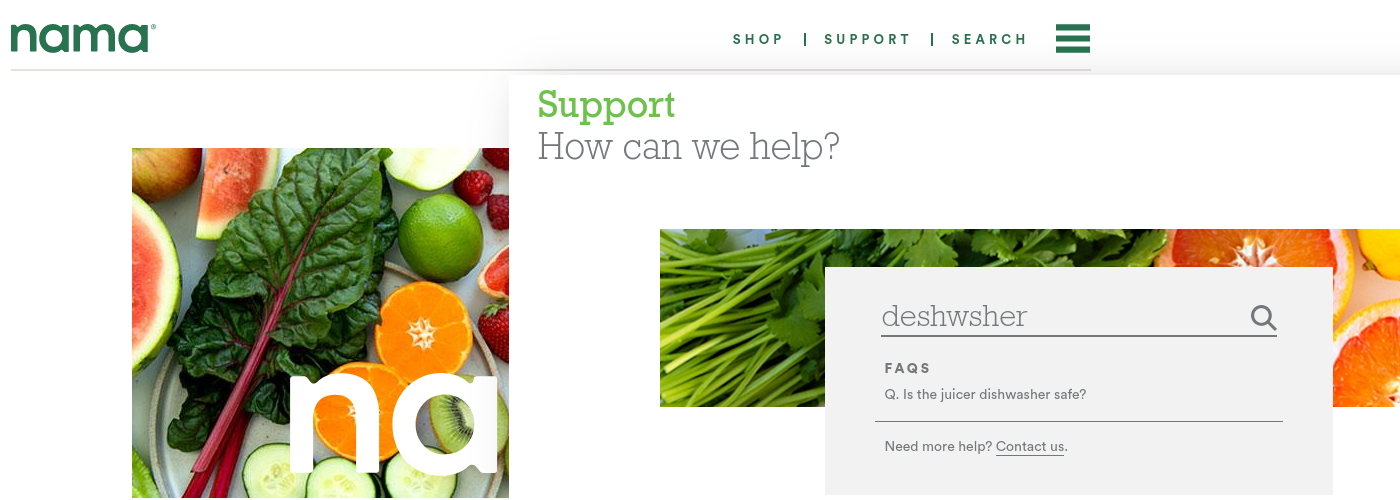
Nama case study
Nama is the creator of a very popular juicing appliance with a strong health and wellness narrative. The original store was hosted on the Shopify platform but lacked features to engage customers post-sale or provide adequate customer support.
Given the sophistication of the main Nama product, technical support problems are an inevitability and out of the box, there is little ability for providing such support through a Shopify store.
With the popularity of the Nama Juicer and supply chain issues, the item has often been out of stock for customers in the Americas, Europe, etc. The simple support for selling items while out of stock is not optimal for conversion to sales when the shopper does not have a clear idea of when they would receive their purchase.
Our solution set
Working with Nama’s design team and ShiloRune, Rational Boxes helped develop a state-of-the-art solution for publishing informational resources to help their customers make the most of their purchases. Advanced integration with Zen Desk for support requests streamlines customer support. A more sophisticated search for the support and FAQ content makes it much easier for customers to locate useful documentation in a self-serve support context. Failed conversions when the item is out of stock are countered by a custom logistics solution that provides specific feedback to the shopper about item availability.
Design and front-end implementation
Rather than use a stock Shopify template we started from scratch using the most modern techniques available in HTML5 and CSS3. By avoiding legacy techniques like Bootstrap layouts the minimum amount of code could achieve complex layouts and effects. Visual flair was implemented in CSS3 transitions for the smoothest possible animations. Screen resolution-independent techniques were employed to account for the range of pixel density in modern devices such as Apple Retina displays.
Where JavaScript was needed scripts were implemented in lightweight pure JavaScript with minimal external dependencies keeping the scripts for cart operations and custom functionality under a handful of kilobytes. Product page and cart scripts were entirely re-implemented in a much more streamlined architecture than Shopify defaults as well as hook into customized behavior for the logistics extensions. Page loading speeds were optimized contributing to the search engine rankings and snappy shopping experience.
Print-like page layouts were achieved using an external content fields tool to allow for the definition of complex content structures featuring sidebars and inline image sets that span between columns of the layout. Mobile widths also feature their layout system optimized for handheld display environments.
Multiple content-specific blogs were defined to provide engaging content for new and existing customers in a highly discoverable way. With attractive article teasers and tag filtering, customers can easily find content relevant to using the product and their healthy lifestyle.
Customer support infrastructure
The ability for end customers to find relevant information and support when having problems with their juicer was another pain point poorly addressed by the Shopify defaults.
We implemented a customized search engine to find the information an owner of the equipment would need to quickly address problems. The custom search is configured to only return results from a specified subset of the site content and implements fuzzy matching (match even when searching phrase misspelled). The indexing is more aware of the site design to prevent irrelevant strings of text from being indexed and returning poor-quality search results.
For cases where a customer cannot find an adequate problem resolution via the content on the site, they would need to contact Nama efficiently. Nama uses Zen Desk to track support and other requests from their existing and potential customers and partners. We implemented a custom and streamlined contact form that routes requests to the correct department within Zen Desk. If a customer has a technical problem they can write the description of the issue and attach a set of photographs or even video to their support ticket. To protect the staff at Nama the integration automatically scans any provided attachments for malware.
Custom logistics
Nama’s primary product is very popular leading to frequent out-of-stock situations. While back-ordering is supported in Shopify, shoppers who encounter an out-of-stock item are likely to move on without making a purchase. To help reduce lost sales we implemented a solution as a custom Shoppify Application that is aware of expected future shipments from the manufacturing plant. When a customer encounters an out-of-stock situation they are informed of the date that the next expected shipment is to arrive and can be shipped to them rather than an ambiguous statement about the item being sold out. When a purchase is made while out of stock the custom logistics server tracks what has been allocated from future expected shipments so the date expectations set for shoppers are as accurate as possible.
Conclusions
This was an interesting project that expands dramatically on the capabilities of a default Shopify store. Development and long-term support contract are continuing with Nama as a satisfied customer. Continuing SEO feedback is guiding continued adjustments to improve the shopping experience and encourage conversions.






